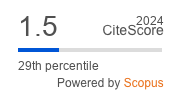Identifying Challenges for Elementary School Teachers in Building Digital Games through a Workshop
DOI:
https://doi.org/10.5753/jis.2024.3951Keywords:
Serious games, Educational games, Game development, Teachers as game developers, Digital literacyAbstract
To develop technologies that facilitate the creation and customization of digital educational games, this research aimed to explore the use of a game authoring tool by elementary school teachers and to identify the challenges and skills of this public using the tool. Our findings indicate that most of them had difficulties using it due to a lack of digital literacy and many possible configuration settings. They struggled with the steps they needed to complete in the tutorial and understanding concepts such as events, conditions, and actions. On the other hand, they were able to easily arrange the objects in the scenes. As a result, we present a set of recommendations that can be useful to construct new tools for this audience.
Downloads
References
Akcaoglu, M. and Kale, U. (2016). Teaching to teach (with) game design: Game design and learning workshops for preservice teachers. Contemporary Issues in Technology and Teacher Education, 16(1):60–81.
Alvarez, J., Djaouti, D., et al. (2011). An introduction to serious game definitions and concepts. Serious games & simulation for risks management, 11(1):11–15.
An, Y.-J. and Cao, L. (2017). The effects of game design experience on teachers’ attitudes and perceptions regarding the use of digital games in the classroom. TechTrends, 61:162–170.
Anisimova, E. (2020). Digital literacy of future preschool teachers. Journal of Social Studies Education Research, 11(1):230–253.
Barney, D. C. and Leavitt, T. (2019). A qualitative investigation of pe teachers perceptions of introductory/warm-up activities in k-12 pe. The Physical Educator, 76(1).
Becker, K. (2007). Teaching teachers about serious games. In EdMedia+ Innovate Learning, pages 2389–2396. Association for the Advancement of Computing in Education (AACE).
De Gloria, A., Bellotti, F., and Berta, R. (2014). Serious games for education and training. International Journal of Serious Games, 1(1).
Degrandis, F., Ângelo, D., Wood, F., Silva, R., and Silva, I. (2022). Metodologia para capacitação professores da educação básica baseada em jogos, gamificação e pensamento computacional. In Anais Estendidos do XXI Simpósio Brasileiro de Jogos e Entretenimento Digital, pages 866–875, Porto Alegre, RS, Brasil. SBC. DOI: 10.5753/sbgamesestendido.2022.226054.
do Prado, L. A. R., de Azeredo Missel, F., and Cruz, D. M. (2020). Game design e educação: formação docente e produção de jogos para alfabetização. Revista Intersaberes, 15(36):988–1009.
Foster, A. and Shah, M. (2020). Principles for advancing game-based learning in teacher education. Journal of Digital Learning in Teacher Education, 36(2):84–95.
Guzzo, D. A. (2020). A utilização de jogos educacionais digitais como proposta de metodologia ativa de ensino para uma aprendizagem significativa na educação básica. Universidade Federal de Santa Maria.
Kaimara, P., Fokides, E., Oikonomou, A., and Deliyannis, I. (2021). Potential barriers to the implementation of digital game-based learning in the classroom: Pre-service teachers’ views. Technology, Knowledge and Learning, 26(4):825–844.
Kanode, C. M. and Haddad, H. M. (2009). Software engineering challenges in game development. In 2009 Sixth International Conference on Information Technology: New Generations, pages 260–265. IEEE.
Li, Q. (2012). Understanding enactivism: a study of affordances and constraints of engaging practicing teachers as digital game designers. Educational Technology Research and Development, 60:785–806.
Manuel, P.-C. V., José, P.-C. I., Manuel, F.-M., Iván, M.-O., and Baltasar, F.-M. (2019). Simplifying the creation of adventure serious games with educational-oriented features. Journal of Educational Technology & Society, 22(3):32–46.
McColgan, M., Colesante, R., and Andrade, A. (2018). Preservice teachers learn to teach with serious games. Journal of STEM Education, 19(2).
Nicolaci-da Costa, A. M., Leitão, C. F., and Romão-Dias, D. (2004). Como conhecer usuários através do método de explicitação do discurso subjacente (meds). VI Simpósio Brasileiro sobre Fatores Humanos em Sistemas Computacionais, IHC, pages 47–56.
Pereira, D. and Rocha, L. (2023). O uso de jogos digitais como ferramenta de aprendizagem. In Anais Estendidos do XXII Simpósio Brasileiro de Jogos e Entretenimento Digital, pages 858–868, Porto Alegre, RS, Brasil. SBC. DOI: 10.5753/sbgamesestendido.2023.233891.
Romero, M. and Barma, S. (2015). Teaching pre-service teachers to integrate serious games in the primary education curriculum. International Journal of Serious Games, 2(1).
SBC, S. B. d. C. (2019). Diretrizes para ensino de computação na educação básica. [link] [Accessed: 2023-11-10].
Souza, J. G. R. and Prates, R. O. (2021). Games by end-users: Analyzing development environments. In 2021 20th Brazilian Symposium on Computer Games and Digital Entertainment (SBGames), pages 69–78. IEEE.
Souza, J. G. R. and Prates, R. O. (2022). Professores do ensino fundamental: contexto social em que estão inseridos e a relação com jogos educacionais. In 2022 21th BrazilianSymposium on Computer Games and Digital Entertainment(SBGames). IEEE.
Toda, A., Palomino, P. T., Rodrigues, L., Klock, A. C., Pereira, F., Borges, S., Gasparini, I., Teixeira, E. H., Isotani, S., and Cristea, A. I. (2022). Gamification through the looking glass-perceived biases and ethical concerns of brazilian teachers. In International Conference on Artificial Intelligence in Education, pages 259–262. Springer.
Downloads
Additional Files
Published
How to Cite
Issue
Section
License
Copyright (c) 2024 Joana Gabriela R. de Souza, Raquel Oliveira Prates

This work is licensed under a Creative Commons Attribution 4.0 International License.
JIS is free of charge for authors and readers, and all papers published by JIS follow the Creative Commons Attribution 4.0 International (CC BY 4.0) license.








